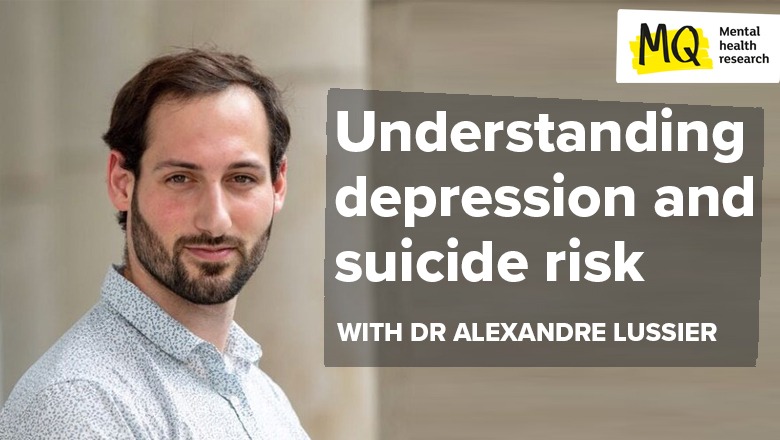[ad_1]
MQ is pleased to announce that Dr Alexandre Lussier from the Lussier Lab at Massachusetts General Hospital has been awarded an MQ Fellowship. Alexandre is studying extent to which the timing of child and adolescent depression interacts with genetic susceptibility to influence suicide risk in early adulthood.
Please give a brief summary of your academic career to date:
Over the years, my academic career has progressed from being narrowly focused on molecular mechanisms to investigating broader social and biological factors that contribute to health.
I received a BSc in Biochemistry from McGill University in 2012 and a PhD in Medical Genetics from the University of British Columbia in 2017. My doctoral research focused on the impact of prenatal alcohol exposure on epigenomic and transcriptomic patterns in animal models and clinical cohorts of individuals with fetal alcohol spectrum disorder (FASD).
Following my PhD, I trained in computational biology and statistical genetics at Cornell University, working on X chromosome variation and psychiatric disease. After this brief fellowship, I began my postdoctoral training in psychiatric and genetic epidemiology at the Massachusetts General Hospital (MGH) and Harvard Medical School (HMS). My postdoctoral research investigated the role of sensitive periods and epigenetic mechanisms in linking early-life environments to mental illness.
As of April 2023, I have transitioned to an Instructor role at MGH and HMS (equivalent to Assistant Professor), which has allowed me to start my own research group. Our work broadly focuses on identifying social and biological mechanisms that be used to prevent and treat psychopathology across the life course.
How long have you been at your current university/institution?
I have worked at MGH and HMS since I began my postdoctoral studies in April 2019 (4.5 years ago).
What is your area of study?
My research focuses on the role of prenatal, childhood, and adolescent stressors and environments in shaping mental health trajectories. Specifically, my research group at MGH uses translational approaches to identify social and biological factors that can help predict, prevent, and treat psychopathology across development. We research the role of sensitive periods and epigenetic mechanisms in linking early-life environments to mental illness across the life course.
As part of my MQ fellows award, I now have the opportunity to extend this work to examine the impact of depression during childhood and adolescence as a risk factor for suicide. Through this research, I aim to identify sensitive periods when depression has a greater impact on suicide risk, as well as genetic and epigenetic mechanisms that can be leveraged to better predict risk for mental illness and develop more timely and targeted intervention strategies.
What motivated you to study this area? Do you have a personal connection to the subject?
Suicide research is definitely underrepresented in the mental health world, as it is a difficult topic to approach and study. Combined with the widespread impact of recent world events on mental illness in young people and adults, research in this area feels particularly important and relevant. Like most people, I also have personal connections to mental health and my work in this area is one of the ways I can contribute to reducing the overall burden of mental illness.
What are you hoping to discover or achieve as a result of your research?
In the long-term, I hope the results of this project will lead to new prediction tools and interventions that can be used to prevent suicide in youth affected by mental illness and distress. These new tools might include genetic and epigenetic prediction algorithms to predict future risk for suicide, or interventions that are timed for periods of increase vulnerability. Ultimately, I hope my work will help more people lead happy, healthy, and successful lives.
How do you feel about getting the Fellows award from MQ?
I am deeply honoured to receive an MQ Fellows award and very excited to conduct this research. This award provides a unique opportunity to complete some important work in the field of suicide research, which I might not have had the chance to complete otherwise. I am very grateful for the support of MQ and their belief in the potential impact of this work.
How important is investment in research for the progression of our understanding of Mental health conditions and treatments?
Research is one of the foundational pillars of mental health and it is vital to invest towards our understanding of mental disorders and their treatments. The mental health field is constantly evolving, and without research to test and validate our models and extend our understanding of mental illness, treatment strategies may go down paths that have the opposite effect, or divest funds that may be more effective in other places. Research is the key to understanding and developing better interventions to prevent and treat mental health conditions.
Is there anything else you would like to say?
I would like to thank MQ and its sponsors for supporting my research, as well as all the people who make this work possible, including study participants, families, clinicians, people with lived experience, fellow researchers, etc. I would also encourage everyone to contribute to mental health however they can – be it helping out a neighbour, friend, or family member, participating in research, or giving back to local communities and organizations invested in mental health support, funding, and research.
Alexandre’s research is supported by the MQ Foundation. You can read more about his research here.
[ad_2]
Source link
